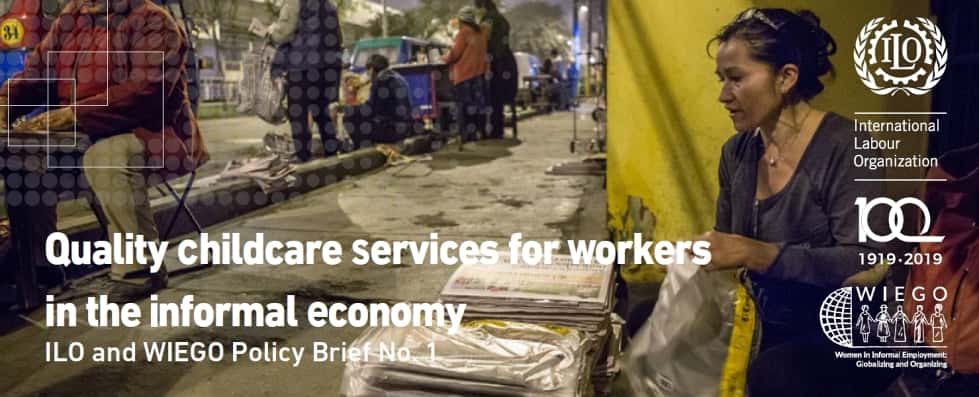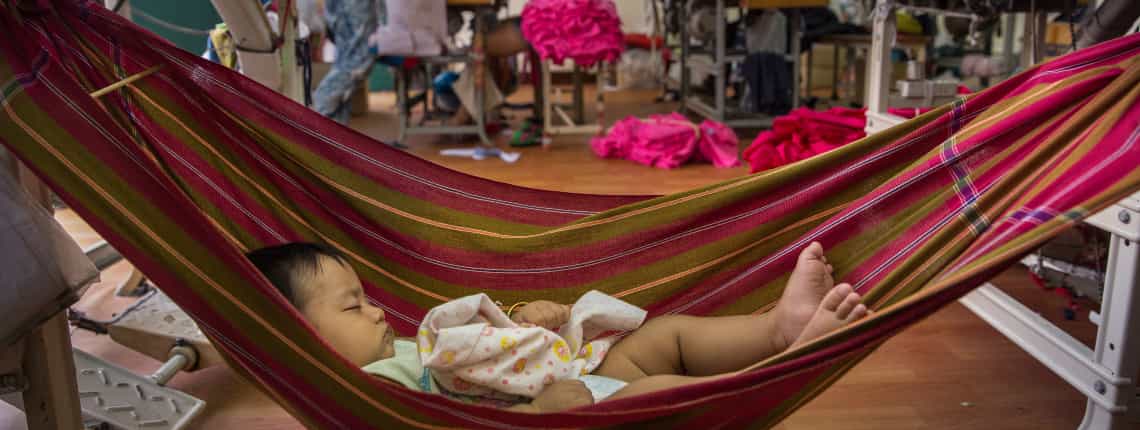By Laura Addati (ILO) and Rachel Moussié (WIEGO)
Few public investments will have as transformative an impact on present and future generations, and on equality between women and men and across social classes, as the investment in childcare. Women workers in the informal economy are most in need of quality childcare, yet public policies and investments are sorely lacking.
A woman’s ability to work when she has a young child depends, almost always, on another woman caring for the child. This caregiver can be a daughter, grandmother, neighbour, domestic worker or childcare worker. And much of this care work is either unpaid or poorly paid. Men are decidedly missing from this picture, but so too is the state.
In a new policy brief series on childcare for informal workers, the International Labour Organization (ILO) and WIEGO reveal why childcare for informal workers is so critical to addressing gender equality.
In a new policy brief series on childcare for informal workers, the International Labour Organization (ILO) and WIEGO reveal why childcare for informal workers is so critical to addressing gender equality. Twenty-five years after the Beijing Declaration and Platform of Action and 100 years since the adoption of the first ILO Maternity Protection Convention, quality public childcare services remain illusory.
The first policy brief in the series outlines the global scale of the problem. Close to one billion women work in the informal economy, and the vast majority lack any support for childcare, either through a maternity benefit and child grant or access to childcare services. In 87 countries with available data, ILO estimates of enrolment rates in childcare services for children between 0-3 years old show that 53 countries had gross enrolment rates below 20 per cent. The average enrolment rate across all countries was 18.3 per cent.
Without access to quality childcare services, women workers in the informal economy suffer multiple labour market penalties. Investing in universal quality childcare services can lead to a triple dividend:
- healthier and more educated children
- new sources of employment for women and men supporting the transition to the formal economy
- more women able to earn regular and higher earnings within the informal and formal economies.

The second policy brief explores the international human rights and labour rights standards that can underpin demands by workers’ organizations and civil society for quality childcare services.
For instance, the ILO Transition from the Informal to the Formal Economy Recommendation, 2015 (No. 204) urges member States to extend, in law and in practice, social security and maternity protection to all workers in the informal economy and to encourage the provision of and access to childcare and other care services so women workers can seek out more secure employment in the formal economy.
A key finding of the series is that when public financing is limited the quality of childcare suffers. What is most striking is the lack of decent work opportunities for childcare workers.
The third policy brief presents policy lessons based on a typology of childcare services currently available to workers in the informal economy. Examples are drawn from Latin America, Asia and Africa. The typology assesses the various forms of childcare provision based on quality and the working conditions for childcare workers — most of whom are themselves women informal workers.
A key finding of the series is that when public financing is limited the quality of childcare suffers. What is most striking is the lack of decent work opportunities for childcare workers. This highly feminized workforce is denied living wages and social protection when centres are financed solely through user fees. Childcare centres, even for the working poor, are expensive to run. Workers in the informal economy cannot shoulder this cost.
Childcare is labour intensive requiring a skilled, dedicated and adequately remunerated workforce. Research shows that the models that are better for parents, children and childcare workers are those that benefit from public funding or subsidies to cover the costs of running the centres. SEWA’s childcare cooperative in India draws on a mix of public subsidies and profits from worker-run cooperatives to finance childcare centres for their members. The Bolivian government is scaling up investment in hiring, training and salaries in public childcare centres, where childcare workers now earn at least the minimum wage and are covered under the social security system. In Hong Kong, the government supports trade unions to train domestic workers in childcare to improve their skills and offer a quality service.
To ensure access to quality childcare and offer a living wage to childcare workers, the ILO estimates that 36 million jobs are needed in childcare for 0-2 year olds and in preschool for 3-5 year olds. However, current levels of investment will only create 15.6 million new jobs in the sector by 2030. The ILO says that $1.07 trillion USD must be invested to provide 20.4 million decent work opportunities. Though a seemingly huge amount, this represents just 1.1. per cent of global GDP—and fills barely more than half the need.
Today, in much of the global South, childcare remains a private issue for women to bear alone. Governments and employers are not investing in quality childcare for workers. Trade unions and informal workers organizations rarely prioritize childcare and parental benefits as a movement-wide struggle. Childcare workers remain a largely unorganized sector, while domestic workers are rarely recognized or remunerated fairly for their childcare skills. Within the early childhood development sector, the focus on young children’s developmental needs often eclipses the practical needs and constraints faced by their carers to earn a living.
This isn’t just short-sighted — it’s a missed opportunity ... to collaborate toward an integrated approach to universal, sustainable and quality childcare services...
This isn’t just short-sighted — it’s a missed opportunity by all these actors to collaborate toward an integrated approach to universal, sustainable and quality childcare services that considers the benefits to children, women workers and childcare workers by prioritizing:
1) the voice of workers
2) state responsibility and public financing
3) childcare as a component of social protection systems
4) pathways toward formalization
5) collective bargaining and civil society alliances.
Feature photo: Ponanan Keawlek, six months old, naps while her mother works in Bangkok, Thailand. Her mother's workplace was founded by former factory garment workers who decided to establish a workers'-owned model, providing decent work for all. The workers all live in the rented space, making childcare — an issue for many informal workers — easier. Credit: Paula Bronstein/Getty Images Reportage
